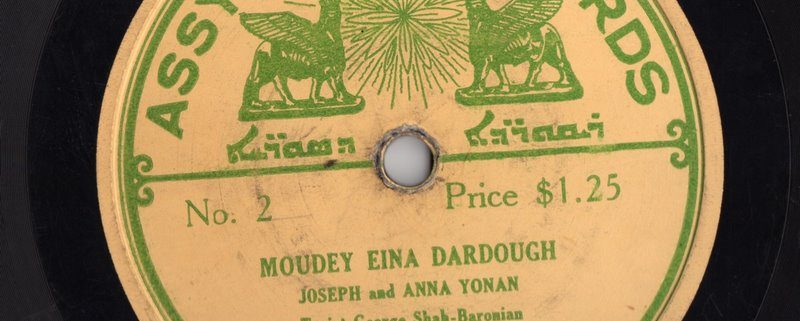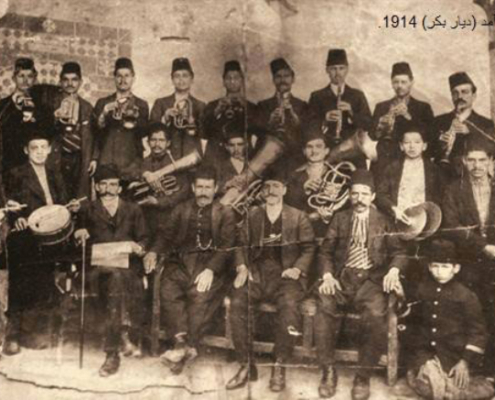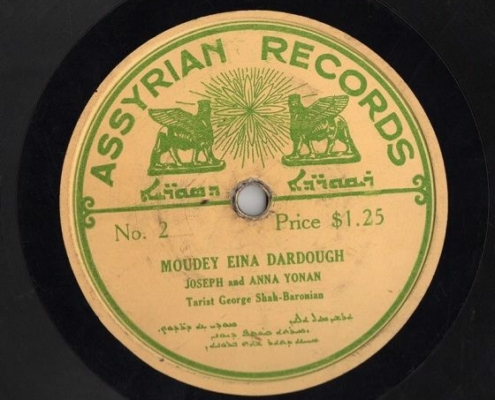Next year Modern Assyrian music will celebrate the 100 years of its birth.
2017 marks the centennial of the birth of Modern Assyrian music. A hundred years of Assyrian music history, a history of good and bad, a history that began in our homeland but continued in the diaspora as a destitute nation.
During World War I, when the Ottoman Turks slaughtered our people, we lost many of our singers and musicians, such as Suryani jerji who was killed by the Turks around 1920. We also lost traditional singers Raweh and diwaneh. We also lost poets, story tellers and church members during the many massacres that our people endured. If our people could have survived these tragedies and established an independent homeland, it is likely that we could have developed a better quality and more genuine modern Assyrian music.
Orchestra of the Church of the Virgin Mary in Omid (Ottoman), circa 1914
Also many of our early singers never recorded their music for different reasons from not being commercially viable to big recording companies working at that time in the Middle East and recording in languages such as Arabic, Turkish and Kurdish, to silly reasons as “the evil recorder will eat my voice” Based on a confirmed family story. 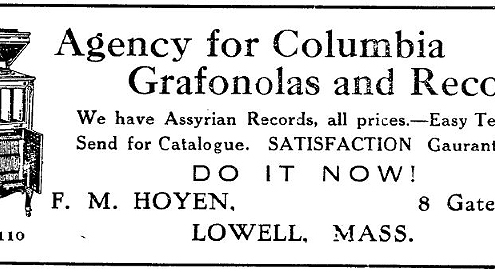
So why 2017..? It all began when we begun researching for materials related to Assyrian music, an old advertisement was found on a page in an Assyrian magazine titled “New Assyria” published in USA, the ad read “we sale Assyrian records ask for our catalogue” the magazine was dated 1917 and the ad was found by Abboud Zeitoune from Germany and author of three books on modern Assyrian music, which includes discographies of all the known Assyrian music.
Until then we never knew that we had Assyrian records released in 1917 but even with the help of the internet our search for more information went nowhere for a while, then after more than a year a person in US listed few records on an auction website titled “Assyrian Records”, the title was interesting so I contacted him and asked about them? He said he only bought them because they had nice graphics on the label “Assyrian winged bull with Assyrian star” they were three records; he bought them from a flea market while traveling in Massachusetts.
That made me excited, and I thought these must be those old Assyrian records from the ad that we have been searching for. I had to buy them, so I made him an offer and he accepted and sooner they arrived in a parcel from USA. He already told me that two of the three are not in a very good shape; I didn’t care if they came in pieces as long as we could confirm the existing of such early rare records. Luckily they arrived in good condition and they were still playable, and I managed to digitize all three records and preserve them for future generation.
Now I own three copies dated to 1917 making them the oldest known modern Assyrian records, and they are numbered as No2, No3, and No4 so we know No1 is missing, and we don’t know if there are more numbers? This discovery pushed back the date from 1929 as the oldest known record to 1917 and the search continues.
The records are 78rpm Shellac released in USA, each record has two songs, they are sung by husband and wife, Joseph Yonan (born abt 1893) and Anna Yonan (born abt 1897) both born in Persia. The melody of the records are probably Azeri from a famous opera (Arshin Mal Alan) released much earlier, the lyrics are in modern Assyrian dialect and we are not sure if they are translation from Azeri or original lyrics.
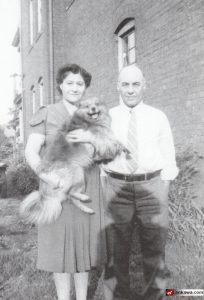 (The couple outside their home in Connecticut, USA)
(The couple outside their home in Connecticut, USA)
Assyrian music has played an important role in preserving part of our language and heritage, not many of our people then or now are able to read and write in Assyrian, but almost all of us listen to our music, especially that which tells the stories and epics from our culture and history, we learn from it about our nation’s glories and tragedies.
Music has become the most widespread medium within our people. We thank the many singers and musicians who have been doing great job in producing beautiful Assyrian music for everyone to enjoy.
100 years have passed; will our music or even our language survive another 100 years? I think if there is no political change or stability in Middle East, then maybe it will only survive in our memories.
Record No.2
Track1 : Soul’tan Beg Sahad wileh
Track2 : Moudey eina Dardough (What are your worries) by Joseph Yonan
Record No.3
Track1 : Be Khzeitakh kha Tahar Wili.
Track2 : Ah Maraley Aziztey
Record No.4
Track1 : Zahmat Grishley.
Track2 : Khosh Khaneemey Beg Labela
Moneer Cherie
Moderator at www.Qeenatha.com
I wrote this article in Arabic which was published on Ankawa.com but I also wrote it in English for the non-Arabic readers (below):
http://www.ankawa.com/forum/index.php?topic=821506.0

